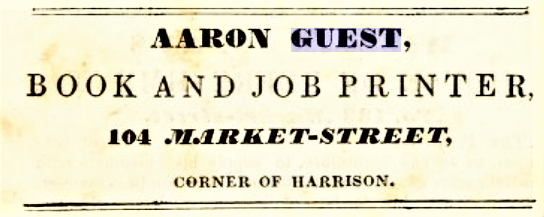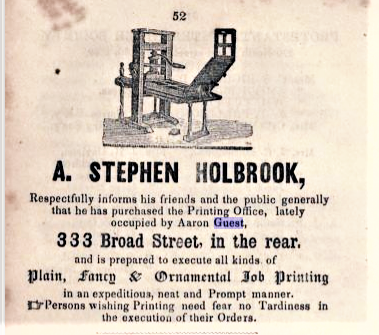 There were two printers named Aaron Guest working in and around Newark, New Jersey, in the mid-1800s. The first might have been African American, born about 1806 and died in Passaic County, New Jersey, in 1893. He was married but no other specifics are listed. The second Aaron Guest was born about 1808, bought a home in Bergen County, New Jersey, married, and is listed as White.
There were two printers named Aaron Guest working in and around Newark, New Jersey, in the mid-1800s. The first might have been African American, born about 1806 and died in Passaic County, New Jersey, in 1893. He was married but no other specifics are listed. The second Aaron Guest was born about 1808, bought a home in Bergen County, New Jersey, married, and is listed as White.
He/they had a printing business in 1838/39 at 104 Market Street; 1840-46 at 121 Market-Street; and 1847-50? at 333 Broad-Street, in the rear. In 1851, the printing shop at 333 Broad Street was sold to Stephen Holbrook, and Guest’s 1851 address was simply “Michigan.”
These are the books printed by one or both Aaron Guests (about 1806-1893) in Newark, NJ 1837-1848. Are they by one or two men?
Edward Sayers, A manual on the culture of the grape,: with a dissertation on the growth and management of fruit trees, adapted to the Northern States (N.J.: Published by the author, and sold by most seedsmen & booksellers in the Union. Aaron Guest, printer, 1837).
Charter of the Bank of New-Jersey (Newark, N.J.: A. Guest, printer, 1837).
Charles Fitch, Views of sanctification (NJ: Aaron Guest, printer, 1839).
James William Charles Pennington, An address delivered at Newark, N.J. at the first anniversary of West India Emancipation: August 1, 1839 (N.J.: Aaron Guest Printer, 1839).
Tyler Thacher, Perfectionism examined (Newark [N.J.] Aaron Guest, Printer; New-York: Sold by John S. Taylor, 1840-1845).
Directory of the city of Newark, compiled by Benjamin T. Pierson. Printed by Aaron Guest, 121 Market-St., 1840-46; 333 Broad-St., in the rear., 1847-48.
Samuel E. Cornish (1795?-1858), Theodore S. Wright, Theodore Frelinghuysen, and others, The Colonization Scheme Considered: in its rejection by the colored people–in its tendency to uphold caste–in its unfitness for Christianizing and civilizing the aborigines of Africa, and for putting a stop to the African slave trade: in a letter to the Hon. Theodore Frelinghuysen and the Hon. Benjamin F. Butler (Newark [N.J.]: Printed by Aaron Guest, 121 Market-Street., 1840).
Charles Fitch, Letter to the Newark Presbytery (N.J., Aaron Guest, printer, 1840).
Hon. Benjamin F. Butler; by the pastors of the Colored Presbyterian Churches in the cities of Newark and New York (Newark: Aaron Guest. 1840)
William Raymond Weeks, Letter to the Rev. Charles Fitch on his views of Sanctification, by the Pastor of the fourth Presbyterian Church (Newark. Aaron Guest, 1840).
Henry William Herbert, The Magnolia: 1841 (New-York: A. & C.B. Edwards, no. 3 Park Row. Aaron Guest, printer., 1840).
James Hewson, Every man his own lawyer, or, The several modes of commencing and conducting actions in the Court for the Trial of Small Causes in the State of New Jersey: rendered plain and easy, with a variety of forms for drawing statements of demand: together with numerous references to the state laws and decisions of the Supreme Court (Newark [N.J.]: A. Guest, printer, 1841).
William Torrey, Address delivered at the temperance convention, held at Morristown, N.J., December 13, 1843; with the proceedings and resolutions of the convention, and also of that held at Hackettstown, N.J., September 26, 1843 (NJ: Aaron Guest, Printer, 1843).
Alexander Gilmore, Review of a sermon preached by N. Murray, pastor of the First Presbyterian Church, Elizabethtown, N.J., at the dedication of a church in Kingston, Pa. (Newark [N.J.]: Aaron Guest, printer, 121 Market-Street, 1843).
Charles Warren, Constitution of the Juvenile Temperance Band, with the duties of the officers and members, to which are appended some counsels of wisdom, and other instructive exercises (New Jersey Juvenile Temperance Band.: Aaron Guest, Printer, 1844).
Oliver S. Halsted, Address upon the character of the late the Hon. Isaac H. Williamson: delivered before the bar of New-Jersey, September 3d, 1844 (Newark, N.J.: Aaron Guest, printer, 1844).
An act to incorporate the Morris and Essex Rail Road Company passed January 29, 1835: with the supplements, passed March 2, 1836; February 22, 1838; January 24, 1839; March 1, 1842, and February 25, 1846. Morris and Essex Railroad Company (N.J.: Aaron Guest, Printer, 1846).
James Munks, Confession of James Munks, who was executed on Saturday, January 23, 1819 for the murder of Reuben Guild (N.J.: Aaron Guest, printer, 1847).
J.B. Condit, A time to die: a discourse delivered at the funeral of John S. Condit, M.D., of Lodi, Hudson County, N.J.: in the Second Presbyterian Church, Newark, April 7, 1848 (N.J.: Aaron Guest, printer, 1848).
Prospectus of the Mutual Benefit Life Insurance Company: with tables of rates for single and joint lives, annuities, and endowments, 1848 (New Jersey, Mutual Benefit Life Insurance Company. N.J.: Aaron Guest, printer, 1848).
“Theodore Sedgwick Wright (Class of 1828) claims a special place in Princeton Seminary history as the first African American to attend and graduate from the Seminary. He attended from 1825 through 1828. The Board of Director’s Minute Book specifically stipulates that his race should be no bar to his admission to the Seminary (he had already been turned down by a number of institutions to which he had applied): “Dr. McAuley, on behalf of the Presbytery of Albany, applied to the Board to have Theodore Wright, a fine young man of color, admitted into the Seminary. Whereupon, resolved that his color shall form no obstacle in the way of his reception.”
“Wright was ordained by the Presbytery of Albany on February 5, 1829. He was named pastor of the First Colored Presbyterian Church of New York City and served the congregation until his death in 1847. By all reports his pastorate was a very successful one, his congregation rapidly growing until they had to find a new meeting place and eventually becoming the second largest African American church in New York City. He and his congregation were active in the Underground Railroad, helping escaping slaves in their travels from the American South to freedom in Canada. In addition, Wright served as an agent of the New England Anti-Slavery Society and worked with other anti-slavery organizations, traveling and lecturing in the cause along with such other well-known African American abolitionists as Frederick Douglass.”
Read more: https://slavery.ptsem.edu/the-report/alumni/

